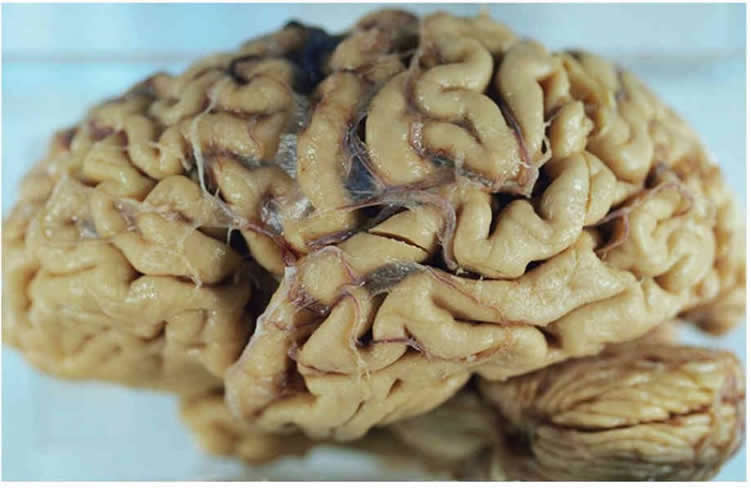Summary: A new study reveals carriers of the ApoE4 gene who have chronic inflammation are more likely to develop Alzheimer’s disease.
Source: Boston University School of Medicine.
While it is widely shown that possessing the ApoE4 gene is the major genetic risk factor of Alzheimer’s disease (AD), not all ApoE4 carriers develop AD. For the first time, researchers at Boston University School of Medicine (BUSM) have shown that ApoE4 linked with chronic inflammation dramatically increases the risk for AD. This can be detected by sequential measurements of C-reactive protein, a common clinical test which can be could be done routinely in a clinical setting.
“Finding out what mediating factors for ApoE4 increase AD risk is important for developing intervention and prevention of the disease,” explained corresponding author Wendy Qiu, MD, PhD, associate professor of psychiatry and pharmacology & experimental therapeutics at BUSM. “Since many elders have chronic low-grade inflammation after suffering from common diseases like cardiovascular diseases, diabetes, pneumonia and urinary tract infection, or after having surgeries, rigorously treating chronic systemic inflammation in ApoE4 carriers could be effective for prevention of Alzheimer’s dementia.”
Using data from the Framingham Heart Study which includes more than 3,000 human subjects, the researchers studied patients with the ApoE4 gene and those with and without chronic low-grade inflammation defined by sequential C-reactive protein measurements. They found carriers of ApoE4 with chronic low-grade inflammation, was more strongly related to onset of dementia as well as AD as compared to ApoE4 carriers without inflammation.

Qiu believes that without chronic low-grade inflammation there could be no difference of Alzheimer’s risk between ApoE4 and non-ApoE4 carriers and that anti-inflammatory treatments could be effective for AD prevention.
Funding: Funding for this study was provided by the National Heart, Lung, and Blood Institute contract (N01-HC-25195) and by grants from the National Institute of Neurological Disorders and Stroke, NS-17950 and from the National Institute on Aging AG-008122, AG-16495; AG-022476.
Source: Gina DiGravio – Boston University School of Medicine
Publisher: Organized by NeuroscienceNews.com.
Image Source: NeuroscienceNews.com image is in the public domain.
Original Research: Open access research for “Association of Chronic Low-grade Inflammation With Risk of Alzheimer Disease in ApoE4 Carriers” by Qiushan Tao, MD; Ting Fang Alvin Ang, MD; Charles DeCarli, MD; Sanford H. Auerbach, MD; Sheral Devine, PhD; Thor D. Stein, MD, PhD; Xiaoling Zhang, PhD; Joseph Massaro, PhD; Rhoda Au, PhD; and Wei Qiao Qiu, MD, PhD in JAMA Network Open. Published October 19 2018.
doi:10.1001/jamanetworkopen.2018.3597
[cbtabs][cbtab title=”MLA”]Boston University School of Medicine”Chronic Inflammation Linked to Increased Risk of Alzheimer’s.” NeuroscienceNews. NeuroscienceNews, 20 October 2018.
<https://neurosciencenews.com/inflammation-alzheimers-10061/>.[/cbtab][cbtab title=”APA”]Boston University School of Medicine(2018, October 20). Chronic Inflammation Linked to Increased Risk of Alzheimer’s. NeuroscienceNews. Retrieved October 20, 2018 from https://neurosciencenews.com/inflammation-alzheimers-10061/[/cbtab][cbtab title=”Chicago”]Boston University School of Medicine”Chronic Inflammation Linked to Increased Risk of Alzheimer’s.” https://neurosciencenews.com/inflammation-alzheimers-10061/ (accessed October 20, 2018).[/cbtab][/cbtabs]
Abstract
Association of Chronic Low-grade Inflammation With Risk of Alzheimer Disease in ApoE4 Carriers
Importance
The association between peripheral inflammatory biomarkers and Alzheimer disease (AD) is not consistent in the literature. It is possible that chronic inflammation, rather than 1 episode of inflammation, interacts with genetic vulnerability to increase the risk for AD.
Objective
To study the interaction between the apolipoprotein E (ApoE) genotype and chronic low-grade inflammation and its association with the incidence of AD.
Design, Setting, and Participants
In this cohort study, data from 2656 members of the Framingham Heart Study offspring cohort (Generation 2; August 13, 1971-November 27, 2017) were evaluated, including longitudinal measures of serum C-reactive protein (CRP), diagnoses of incident dementia including AD, and brain volume. Chronic low-grade inflammation was defined as having CRP at a high cutoff level at a minimum of 2 time points. Statistical analysis was performed from December 1, 1979, to December 31, 2015.
Main Outcomes and Measures
Development of AD and brain volumes.
Results
Of the 3130 eligible participants, 2656 (84.9%; 1227 men and 1429 women; mean [SD] age at last CRP measurement, 61.6 [9.5] years) with both ApoE status and longitudinal CRP measurements were included in this study analysis. Median (interquartile range) CRP levels increased with mean (SD) age (43.3 [9.6] years, 0.95 mg/L [0.40-2.35 mg/L] vs 59.1 [9.6] years, 2.04 mg/L [0.93-4.75 mg/L] vs 61.6 [9.5] years, 2.21 mg/L [1.05-5.12 mg/L]; P < .001), but less so among those with ApoE4 alleles, followed by ApoE3 then ApoE2 genotypes. During the 17 years of follow-up, 194 individuals (7.3%) developed dementia, 152 (78.4%) of whom had AD. ApoE4 coupled with chronic low-grade inflammation, defined as a CRP level of 8 mg/L or higher, was associated with an increased risk of AD, especially in the absence of cardiovascular diseases (hazard ratio, 6.63; 95% CI, 1.80-24.50; P = .005), as well as an increased risk of earlier disease onset compared with ApoE4 carriers without chronic inflammation (hazard ratio, 3.52; 95% CI, 1.27-9.75; P = .009). This phenomenon was not observed among ApoE3 and ApoE2 carriers with chronic low-grade inflammation. Finally, a subset of 1761 individuals (66.3%) underwent brain magnetic resonance imaging, and the interaction between ApoE4 and chronic low-grade inflammation was associated with brain atrophy in the temporal lobe (β = –0.88, SE = 0.22; P < .001) and hippocampus (β = –0.04, SE = 0.01; P = .005), after adjusting for confounders.
Conclusions and Relevance
In this study, peripheral chronic low-grade inflammation in participants with ApoE4 was associated with shortened latency for onset of AD. Rigorously treating chronic systemic inflammation based on genetic risk could be effective for the prevention and intervention of AD.






